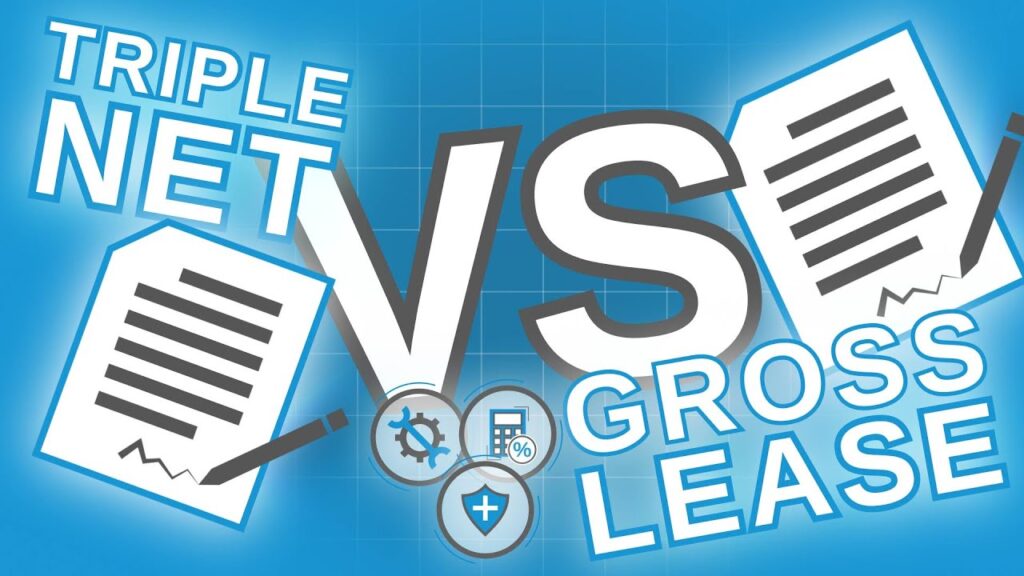When leasing commercial real estate in Dubai, understanding the types of lease agreements available is essential for both landlords and tenants. Two prominent types of leases are gross leases and triple net leases (NNN). Each type comes with unique characteristics, advantages, and disadvantages, which can significantly impact a business’s financial planning and operational flexibility. This guide provides a detailed comparison of gross lease vs triple net lease, offering insights into their implications for tenants and landlords in Dubai’s dynamic real estate market.

What is a Gross Lease?
A gross lease is a type of commercial lease agreement where tenants pay a fixed rental amount, and the landlord covers all operating expenses associated with the property. These expenses typically include property taxes, insurance, maintenance, and utilities. This arrangement simplifies the tenant’s financial responsibilities and provides cost predictability.
Key Features of a Gross Lease
- All-Inclusive Rent: The rent encompasses all operating costs, eliminating the need for tenants to handle separate payments for utilities, property taxes, or maintenance.
- Landlord Responsibilities: The landlord oversees property upkeep, maintenance, and repairs, alleviating the tenant’s management burden.
- Cost Stability: Tenants benefit from a predictable monthly expense, aiding in financial planning and budgeting.
Types of Gross Leases
- Full-Service Gross Lease: Includes all operating costs, utilities, janitorial services, and, in some cases, additional services like security.
- Modified Gross Lease: Some expenses, such as utilities, may be shared or passed on to the tenant, while the landlord covers other costs.
Advantages of Gross Leases
- Simplicity: A single, fixed rental payment simplifies financial management.
- Reduced Management Responsibilities: Tenants can focus on business operations without worrying about property upkeep.
- Predictable Expenses: Fixed costs make it easier to forecast expenses.
Disadvantages of Gross Leases
- Higher Base Rent: The convenience of an all-inclusive rent often results in higher monthly payments.
- Limited Control Over Costs: Tenants have little influence over how operating expenses are managed by the landlord.
What is a Triple Net Lease (NNN)?
A triple net lease (NNN) is a commercial lease where tenants pay a lower base rent but are also responsible for additional expenses: property taxes, insurance premiums, and maintenance costs (often referred to as Common Area Maintenance or CAM). This arrangement shifts more financial responsibility to the tenant.
Key Features of a Triple Net Lease
- Separate Expense Payments: Tenants handle operating expenses alongside their base rent payments.
- Lower Base Rent: The initial rent is typically lower since the tenant assumes responsibility for property expenses.
- Operational Control: Tenants have more control over maintenance and can select service providers that suit their needs.
- Variable Costs: Expenses such as property taxes and maintenance can fluctuate, impacting overall costs.
Advantages of Triple Net Leases
- Lower Initial Costs: Reduced base rent can be attractive for businesses with tight budgets.
- Transparency in Costs: Tenants have clear visibility into property expenses.
- Cost Savings Potential: If operating costs decrease, tenants can directly benefit.
Disadvantages of Triple Net Leases
- Unpredictable Costs: Fluctuating expenses, such as rising taxes or unexpected repairs, can disrupt budgeting.
- Increased Responsibilities: Tenants must manage property maintenance and ensure compliance with local regulations.
- Financial Risk: Unexpected expenses can pose financial challenges.
Gross Lease vs Triple Net Lease: Key Differences
| Aspect | Gross Lease | Triple Net Lease (NNN) |
|---|---|---|
| Rent Structure | Fixed rent covering all operating expenses | Lower base rent; tenant pays property expenses |
| Responsibility for Costs | Landlord covers taxes, insurance, maintenance, utilities | Tenant pays taxes, insurance, and maintenance |
| Predictability | Predictable, fixed monthly costs | Variable costs depending on expenses |
| Control Over Expenses | Limited control for tenants | Tenants control property management |
| Financial Risk | Lower risk for tenants | Higher risk due to variable expenses |
Choosing Between Gross Lease vs Triple Net Lease in Dubai
When selecting a lease type, consider the following factors:
1. Business Type and Size
- Startups and Small Businesses: Gross leases are often preferred due to fixed costs and minimal management burden.
- Established Businesses: Larger companies may opt for NNN leases to benefit from lower base rents and operational control.
2. Financial Stability
- Businesses with stable cash flow can manage the variable costs of NNN leases.
- Companies prioritizing budget certainty may lean toward gross leases.
3. Property Type
- Retail Spaces: Often use triple net leases, allowing landlords consistent income while tenants manage operational costs.
- Office Spaces: Gross leases are common to provide tenants with simplified arrangements.
4. Market Conditions
- In a competitive market, tenants may negotiate favorable terms in either lease type.
Negotiating Lease Terms
Regardless of the lease type, effective negotiation is crucial:
- Understand Market Trends: Research current rental rates and property values in Dubai.
- Define Your Needs: Assess your business’s capacity to manage operational responsibilities.
- Seek Professional Advice: Engage a real estate agent or legal expert to review lease agreements.
- Request Detailed Documentation: For NNN leases, ensure transparency in expense allocation.
FAQs About Gross Lease vs Triple Net Lease
1. What is a gross lease? A gross lease is a commercial leasing agreement where the tenant pays a fixed rental amount, including all operating expenses like property taxes, insurance, and maintenance.
2. What is a triple net lease (NNN)? A triple net lease requires tenants to pay a lower base rent but also cover property taxes, insurance premiums, and maintenance costs.
3. Which lease type has higher initial costs? Gross leases typically have higher initial costs due to their all-inclusive nature, while triple net leases offer lower base rents.
4. Are triple net leases riskier? Yes, triple net leases can be riskier for tenants due to variable operating costs, such as fluctuating property taxes or unexpected repairs.
5. Can lease terms be negotiated? Absolutely. Tenants can negotiate terms in both lease types, including rent amounts, included services, and responsibilities for expenses.
Conclusion
Choosing between a gross lease and a triple net lease in Dubai requires a thorough understanding of their differences and careful evaluation of your business’s needs. While gross leases offer simplicity and predictable costs, triple net leases provide lower base rents and greater control over property expenses. By assessing factors like financial stability, property type, and operational priorities, tenants and landlords can make informed decisions that align with their goals. Whether you prefer cost predictability or operational control, selecting the right lease type can enhance your commercial real estate experience in Dubai.








